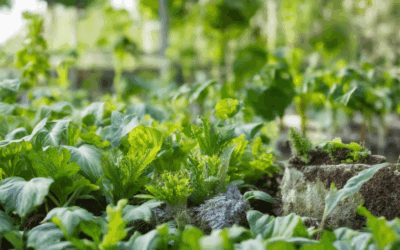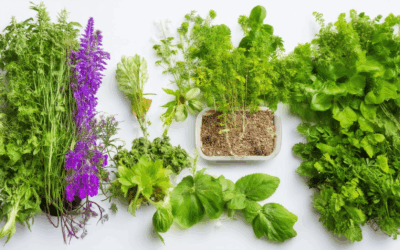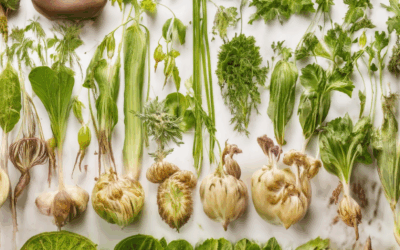Diversifying your gardening approach with homemade organic pesticides offers a sustainable and eco-friendly solution to protect your vegetable garden. By utilizing natural ingredients, you can effectively repel pests while safeguarding the health of your plants and the environment. Whether you’re new to gardening or looking to reduce your chemical usage, crafting DIY organic pesticides can be a rewarding experience. From simple mixtures like vinegar solutions to more complex blends involving neem oil and garlic, there are numerous natural alternatives to conventional pesticides that can provide robust protection. In this guide, we’ll explore the methods, benefits, and tips associated with creating and applying DIY organic pesticides, helping you maintain a thriving and healthy garden year-round. Discover how these natural remedies can enhance your gardening success and contribute to a more sustainable future.
Key Takeaways
– DIY Organic Pesticides: Create natural alternatives like compost and neem oil to protect your garden without harmful chemicals.
– Natural Pest Control: Use biological methods, such as ladybug introduction, to manage pests effectively.
– Soil Health Boosters: Incorporate natural fertilizers and cover crops to enhance soil health and reduce pest issues.
– Effective Weed Management: Implement mulching techniques and crop rotation to suppress weeds naturally.
– Sustainable Practices: Combine rotational grazing and manual weeding for targeted weed control and eco-friendly farming.
How to Make an Organic Pesticide at Home
Making your own organic pesticide can be an effective and eco-friendly way to protect your garden from pests. Here’s a step-by-step guide to crafting a simple yet powerful natural pesticide:
Ingredients
- Neem oil
- Garlic
- Chili powder
- Dish soap
- Water
- Optional: Castor oil or molasses
Preparation
Combine the chosen ingredients in a large container. For a standard-sized garden, mix approximately:
- 1 gallon of water
- 1 teaspoon of neem oil
- 1 clove of minced garlic
- 1 teaspoon of chili powder
- 1 tablespoon of dish soap
- Optional: 1 tablespoon of castor oil or molasses
Mix the ingredients thoroughly. Let the mixture sit for 24 hours to allow the active ingredients to infuse. Strain the solution through a fine mesh to remove any undissolved solids.
Application
Apply the pesticide solution to the affected plants using a spray bottle or a watering can. Ensure thorough coverage on leaves, stems, and affected areas. Reapply every 7-10 days or as needed, depending on pest activity and environmental conditions.
Tips
- Wear gloves and protective clothing when handling pesticides.
- Test the solution on a small area of the plant before full application.
- Avoid applying during the plant’s flowering stage to protect pollinators.
- Store the pesticide in a sealed container away from direct sunlight.
Dilution Ratios
For larger areas or more severe infestations, you may want to increase the concentration. However, always dilute the solution according to the instructions to avoid harming your plants.
By using this organic pesticide, you’ll help protect your garden while maintaining its health and sustainability. For more tips and alternative recipes, visit our garden care resources .
Does Spraying Vinegar on Plants Keep Bugs Away?
Vinegar is indeed an effective natural remedy for keeping bugs away from plants. Its acidic properties act as a natural insect repellent, effectively disrupting the nervous systems of pests like aphids, spider mites, and other common garden pests. Here’s how it works:
- Natural Insect Repellent: Vinegar can repel various insects that may damage your plants, including aphids, spider mites, and even snails and slugs.
- Safe for Plants: When diluted properly, vinegar is safe for most plants and won’t cause harm to their leaves or roots.
- Effective Against Pests: Regular application can significantly reduce pest populations, leading to healthier plant growth and improved yields.
For best results, mix equal parts water with white vinegar (not apple cider vinegar) and spray directly onto affected plant areas. Avoid applying vinegar to flowers or fruit-bearing plants, as it may harm them.
For more effective pest control, consider combining vinegar treatments with other natural methods, such as companion planting or introducing beneficial insects.
Visit our gardening supplies section for more natural gardening solutions and tools to enhance your gardening efforts.
Best Homemade Plant Pesticides
We’ve compiled a list of effective and safe homemade plant pesticides using everyday household items. These solutions are perfect for protecting your garden from pests while avoiding harmful chemicals.
- Neem Oil Solution : Mix 1 tablespoon of neem oil with 2 tablespoons of mild liquid soap (like dish soap) and 10 cups of water. Neem oil suffocates pests and prevents eggs from hatching. Learn more .
- Dish Soap Spray : Combine 1 teaspoon of dish soap with 1 gallon of water. Shake well and spray directly on affected plants. It works as a contact killer for soft-bodied insects like aphids and spider mites.
- Baking Soda Paste : Mix 1 cup of baking soda with 1 gallon of water. Apply as a paste to plant leaves to combat powdery mildew and fungal infections.
- Vinegar Solution : Dilute 1 cup of white vinegar with 1 gallon of water. Spritz onto plants to kill mold and fungi, acting as a natural disinfectant.
- Essential Oils : Combine 1 teaspoon of eucalyptus, peppermint, or rosemary oil with 2 cups of water. Shake and spray to repel pests like mosquitoes and aphids.
- Garlic and Onion Spray : Puree 4 cloves of garlic and 1 onion, then strain through a cloth. Mix with 1 gallon of water and 1 teaspoon of dish soap. This natural repellent deters many common garden pests.
- Milk Solution : Soak cotton balls in 1 gallon of milk and place near plants to attract and kill pests like snails and slugs overnight.
Application Tips: Always test pesticides on a small portion of the plant first. Avoid using too much concentration, especially on edible plants. Reapply as needed every 7-14 days depending on pest activity.
Important Note: While these solutions are effective, some pests may require professional treatment. Monitor your plants regularly and combine multiple methods for better results.
What Do Organic Farmers Use Instead of Pesticides?
Organic farmers rely on a variety of natural and sustainable methods to protect their crops from pests and diseases without using synthetic pesticides. Here are some common alternatives they employ:
- Compost and Natural Fertilizers : Organic farmers often use compost made from kitchen scraps and animal manure to enrich the soil. This promotes plant health and reduces the need for external inputs.
- Crop Rotation : By rotating crops, farmers maintain soil health and disrupt pest life cycles, reducing the need for chemical treatments.
- Natural Fertilizers : Sulfur, rock phosphate, and copper sulfate are examples of natural fertilizers used to supply essential nutrients to plants.
- Intercropping : Planting two or more crops together, such as beans and squash, enhances biodiversity and deters pests, while also improving nutrient uptake.
- Biological Pest Control : Farmers use natural predators like ladybugs to control pest populations, minimizing the need for chemical insecticides.
- Biodiversity : Maintaining diverse plant species attracts beneficial insects and birds that act as natural pest controllers.
- Manual Pest Removal : Regular inspection and hand-removal of pests like aphids and snails are common practices in organic farming.
- Natural Sprays : Solutions like neem oil, garlic, and chili sprays are used to repel pests and treat diseases without harmful chemicals.
These methods not only reduce reliance on synthetic pesticides but also promote ecological balance and long-term soil health.
The Most Effective Natural Pesticides
Natural pesticides offer a safe and eco-friendly alternative to synthetic chemicals. Among the many options available, certain natural substances stand out for their effectiveness and versatility. Below are some of the most commonly used and effective natural pesticides:
- Boric Acid – A versatile pesticide derived from boron, it’s effective against various pests like insects and mites. It’s often used in gardens and homes.
- Coffee Grounds – Repels ants and slugs by creating an unpleasant taste. They’re also rich in nutrients that improve soil health.
- Epsom Salt – While primarily known for boosting magnesium in plants, it also acts as a natural fungicide, useful against powdery mildew and other fungal issues.
- Neem Oil – A popular organic pesticide extracted from the neem tree. It’s effective against insects and fungi, and it’s safe for use on plants and the environment.
- Compost – Incorporating compost into the soil improves plant health and acts as a natural deterrent to pests. It also enhances soil structure and nutrient content.
- Sodium Borate – Similar to boric acid, it’s effective against various pests and is often used in garden settings.
- Garlic Spray – Made from diluted garlic water, it repels pests like aphids and spider mites. It’s easy to prepare and safe for plants.
- Pyrethrins – Derived from pyrethrum daisy flowers, these natural insecticides are effective against a wide range of pests and are considered safer than synthetic alternatives.
When choosing natural pesticides, consider factors like the specific pest you’re targeting, application frequency, and compatibility with your planting schedule. Always test on a small area first to ensure there’s no adverse reaction. For more information on effective natural gardening solutions, explore our organic gardening resources .
How Do Organic Farmers Control Weeds Without Chemicals?
Organic farmers employ various effective strategies to manage weeds without relying on synthetic chemicals. Here are some key methods they use:
Mulching Techniques
- Cover Crops : Farmer grows dense cover crops like clover or rye grass during the growing season. These crops block out light, preventing weed seeds from germinating. After harvest, they till the soil, incorporating the cover crop residue into the soil as organic matter.
- Dead Mulch : Leaving dead plant material, such as crop residues, on the surface of the soil acts as a natural mulch. It retains moisture, suppresses weed growth, and improves soil fertility over time.
- Living Mulch : Plants like comfrey or sweet clover can be used as living mulch. They grow quickly and outcompete weeds while providing nutrients to the soil.
Crop Rotation and Interplanting
- Rotational Grazing : By rotating grazing animals over fields, farmers can control weed populations. The animals’ activity breaks up weed growth and disperses seeds.
- Interplanting Crops : Planting crops in dense rows or interplanting with nitrogen-fixing plants like legumes helps outcompete weeds. This method creates a competitive environment that reduces weed establishment.
Biological Controls
- Insectaries and Predators : Introducing beneficial insects like ladybugs or parasitic wasps can help control weed-related pests. These predators reduce the population of herbivorous insects that might otherwise damage crops or spread weeds.
- Composting : Applying compost to the soil enhances its structure and fertility. This encourages beneficial microorganisms that break down organic matter, suppressing pathogens and reducing weed growth.
Manual and Mechanical Methods
- Hand Weeding : Small-scale farms often manually remove weeds, especially in high-value crops or around sensitive areas.
- Mechanical Weeders : Using tools like cultivation equipment or hoeing robots can effectively control weeds without chemical inputs. These machines are often adapted to work alongside planting machinery.
Soil Health and Agitation
- Healthy Soil : Focus on building healthy soil through organic amendments like compost and manure. Healthy soil has better structure and microbial activity, which supports plant growth and suppresses weeds.
- Agitation : Regularly stirring or aerating the soil can disrupt weed roots and prevent them from establishing deep networks.
Conclusion
By combining mulching, crop rotation, biological controls, and manual methods, organic farmers effectively manage weeds while maintaining soil health and biodiversity. These approaches not only reduce reliance on chemicals but also promote sustainable farming practices that benefit the environment and future crop yields.








0 Comments